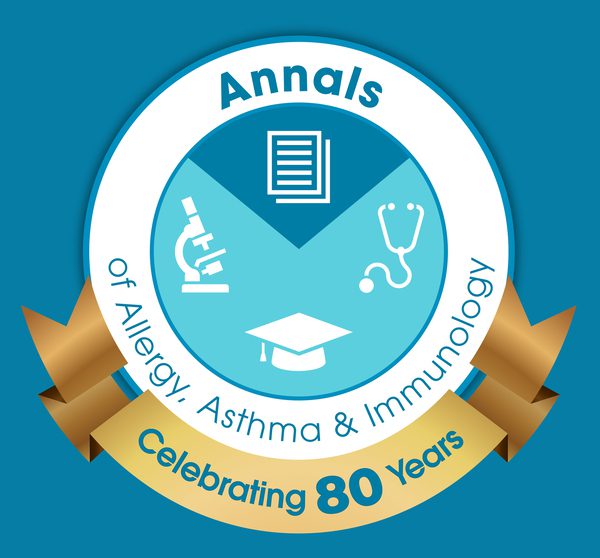Happy New Year! As you get back in the swing of work in the new year, be sure to check out this month’s Annals of Allergy, Asthma & Immunology. Our focus this issue is on pediatric and adolescent asthma. The CME Review focuses on the use of biologics in pediatric asthma and what the future will hold. Pretty timely for the first issue of the year!
In another review, learn how oscillometry can add to spirometry in your asthma treatment – potentially helping with choosing targeted therapies for your patients. The final review this month focuses on the management of the pediatric patient with asthma and obesity. Insightful perspectives examine the best strategy to prevent asthma exacerbations in the inner city, as well as whether we can (more effectively?) use technology to improve adherence and asthma outcomes in children and adolescents.
Original articles this month cover many important topics in the field. Asthma studies include the use of the International Severe Asthma Registry to determine comorbidities and multimorbidity in adult patients with asthma. An interesting study looks at the link between early childhood airway symptoms and school-age lung function. How does post-traumatic stress in World Trade Center workers with asthma impair their ability to perceive airflow limitation? Find out in another intriguing original article this month. Other studies look at sleep quality in chronic rhinosinusitis and how it is impacted by dupilumab, exploring the patient perspective in hereditary angioedema, and characterizing and diagnosing gibberellin-regulated protein sensitization.
Letters this month outline a potential “roadmap” for switching biologics in severe asthma, characterizing moderate-to-severe asthma patients with preserved small airway function, the role of penicillin allergy – from patient and clinician perspectives to the effect of penicillin allergy on outcomes from acute pyelonephritis – and a study gauging parental interest in peanut challenges.
Enjoy this month’s Marginal Zone, which uses CRISPR technology to build the perfect furry pet for those cold winter nights. Celebrate the new year and the fact that you have an entire 12 months of Annals ahead of you. If you have any comments, please consider sending correspondence to Annals (email us at annals@ACAAI.org). We are always excited to hear how Annals has helped you improve the lives of your patients!
Mitchell H. Grayson, MD, FACAAI
Editor-in-Chief


